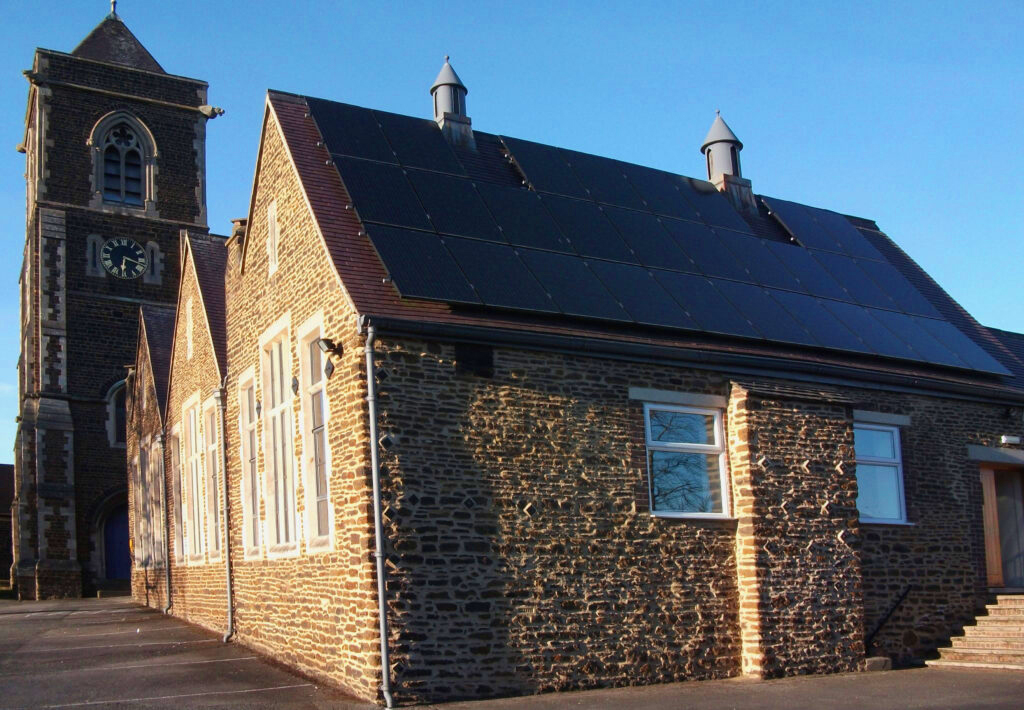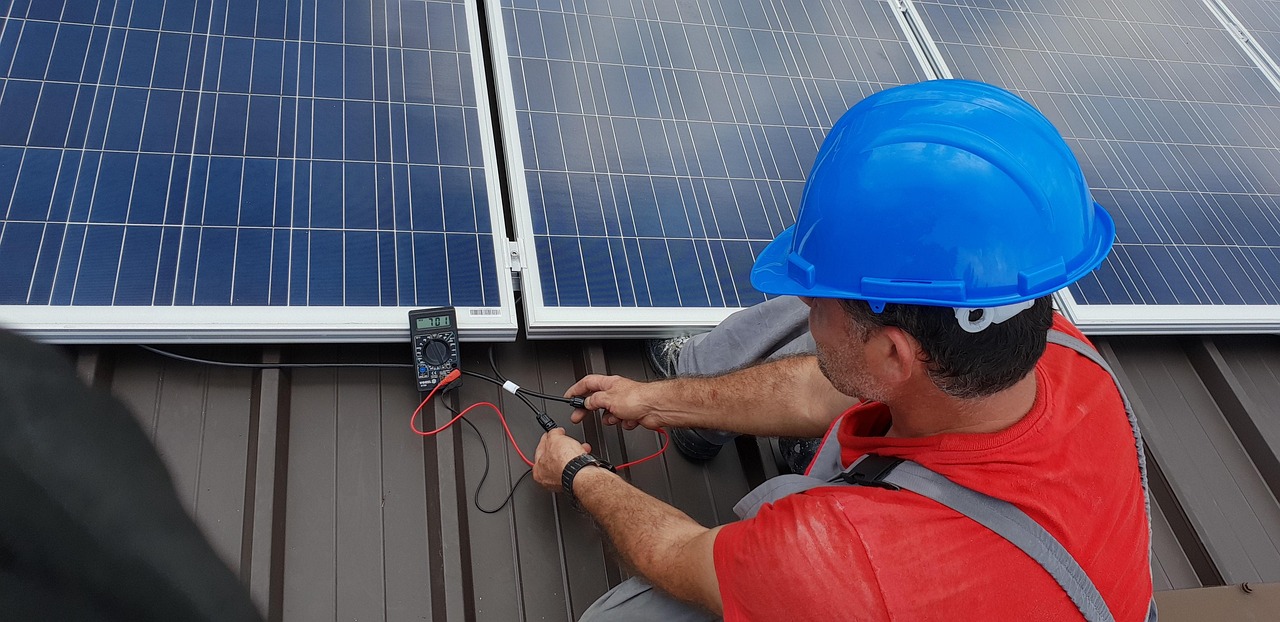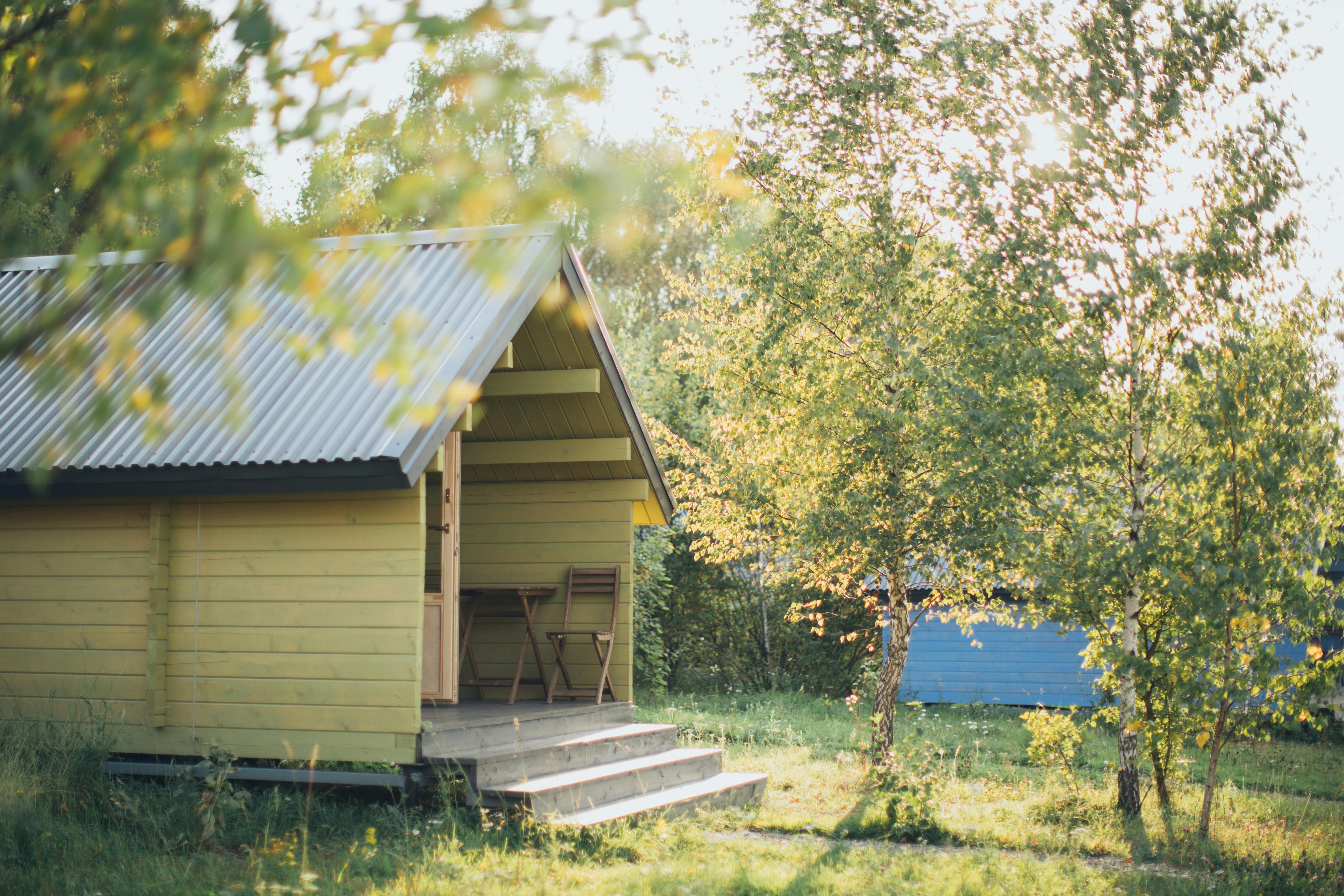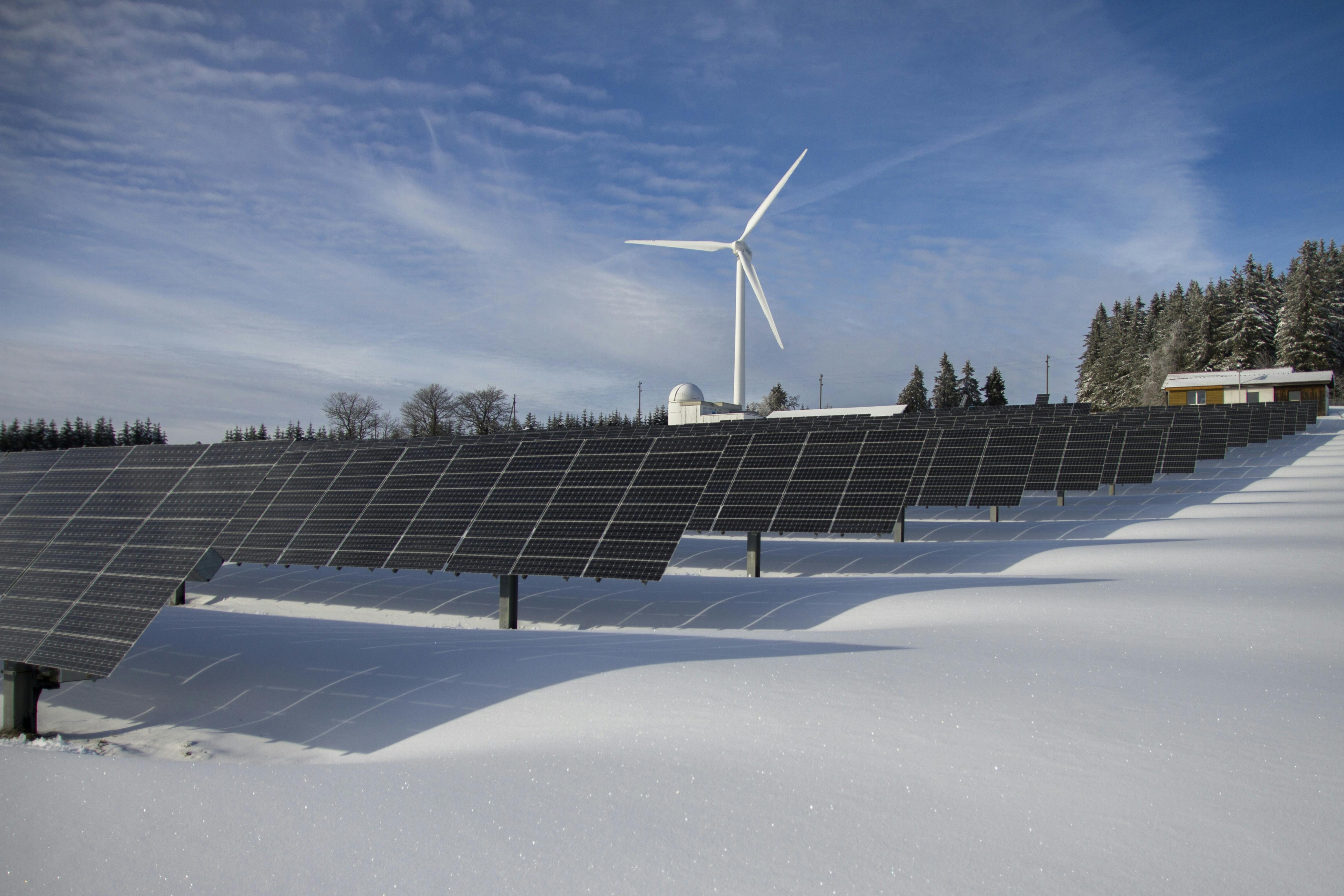Can You Run Your House Just On Solar?
Can your home be independent from the grid? Our latest guide has the answers.

Yes, it is technically possible to run your house entirely on solar power in the UK, but it's not common among homeowners. Due to significant upfront costs, space limitations, and unreliable weather conditions, going completely off-grid is often an impractical and unnecessarily restrictive goal for most UK households.
With a typical solar installation, homeowners get around 50% of their power from solar and supplement the rest with energy from the grid. This already leads to significant savings: On average, homeowners with solar save over £1000 a year on their energy bills. Even without complete grid independence, switching to solar can have a massive environmental impact, slashing a typical household’s carbon emissions by one tonne per year.
Aiming to go off grid would require systems with 40 panels or more, while by contrast, a typical UK household only needs 8-13 panels. Few homes have enough space for this many panels, and the costs of an installation of that size do not directly translate into energy savings.
Due to reduced sunlight, going off-grid would also make having a reliable source of power during the winter difficult. However, during summer months, even homes with a standard solar installation could function independently of the grid. This means that homes with a standard solar set-up could still be self-sufficient for part of the year.
Main Solar Takeaways
- Off-grid solar is doable but impractical in the UK - The country's weather conditions make complete solar independence challenging. Winter generation drops to 10-15% of summer output, requiring oversized systems and backup power sources.
- Most homes get grid connected systems - Most UK homeowners install solar systems with battery storage, which cover around 50% of their electricity needs while maintaining a connection to the grid. This provides substantial savings and environmental benefits without the complexity of off-grid living.
- Smarter usage can improve grid independence - Standard solar installations combined with smart energy management, usage scheduling, and battery storage are the most cost-effective and sustainable solution for most UK homes
To see what level of grid independence is feasible for you given your exact home and energy needs, book a call with our team to get their expert assessment.
Is it typical for UK homeowners to run their entire house on solar power?
While possible, relying completely on solar is uncommon in the UK. Due to practical and economic barriers, grid-tied systems are usually more appealing to homeowners. Here are a few of the reasons:
Space Limitations Complete solar reliance demands significantly more roof space than standard installations. Off-grid setups often require 40+ panels to generate sufficient winter power, with panels measuring an average of 1 by 1.7 metres. Considering the space that this many panels would occupy, finding enough adequate south-facing roof space without shade from neighboring buildings or trees is unrealistic for most homes.
Seasonal Energy Challenges In the winter, solar generation drops by 80-90% compared to the summer months, while heating demands increase dramatically. This makes it difficult to power a home independently of the grid without massive backup generators. However, during summer months, most homes with solar can rely purely on the energy they generate.
Backup Power Dependencies Most off-grid systems still rely on diesel or gas generators as backup power sources, undermining a switch to entirely renewable energy. These generators require regular maintenance and fuel storage, while producing emissions during operation. Without backup systems, power outages during extended cloudy periods become almost inevitable.
Appliance Usage Limitations Complete solar reliance often requires significant lifestyle changes. High-energy appliances like electric showers, tumble dryers, and electric heating may require you to schedule your usage around times when your solar generation is at its peak. In the winter, when less solar power is generated, energy management becomes particularly restrictive. Families might need to limit heating hours, avoid simultaneous use of multiple appliances, or charge electric vehicles outside of the home.
Due to the above factors, most UK homeowners opt for grid-tied solar systems with battery backup instead. These systems reduce energy bills by 70-90% while maintaining a grid connection for reliability.
Where to start with running your house entirely on solar power
If you are still thinking about going off the grid, you should first consider several key areas to determine feasibility and costs.
Energy Usage Assessment
Calculate Daily Energy Consumption Review 12 months of electricity bills to understand your annual usage, typically between 2,500 and 4,500kWh for UK homes. Calculate daily averages and identify seasonal variations – winter consumption often nearly doubles due to lighting and heating needs.
Appliance Energy Audit List all electrical appliances with their wattage and usage patterns. This will help you understand which of your appliances use a lot of power and what times you use them. You may have to schedule your usage of high-power appliances for peak solar production times or reduce your energy consumption for off-grid living.
Property Assessment
Roof Space and Orientation Measure available roof area – each kW of solar capacity requires approximately 6-8 square metres. You can also use our solar calculator to easily draw the outline of your roof and get an accurate estimate of its size and solar potential. In your planning, consider:
- Roof pitch (30-45 degrees is optimal)
- Shading from trees, buildings, or chimneys
- Planning permission requirements for listed buildings or conservation areas
Space for Equipment Identify locations for:
- Battery storage systems (requiring ventilated, temperature-controlled space)
- Inverter equipment (typically garage or utility room)
- Backup generator positioning (outdoor, well-ventilated area with fuel storage)
Professional Assessment
The MakeMyHouseGreen team offers complimentary consultations and remote home surveys as part of our process. This allows us to assess the details of your home and design the ideal solar system for your needs. We are also happy to consult with you about whether an off-grid system is feasible for you.
Making your solar panel usage as efficient as possible
Even if you don’t go completely off-grid, being strategic about your energy usage will allow you to be less reliant on the National Grid for your power. With proper considerations, you’ll be able to cover most of your usage with the energy generated by your solar panel system.
1. Time High-Energy Appliances to Daylight Hours
Schedule major appliances to run during the hours when solar generation is at its peak – typically between 10am-4pm. Key appliances and their typical consumption include:
- Washing machines: 2-2.5kWh per cycle (1-2 hours)
- Dishwashers: 1.5-2kWh per cycle (2-3 hours)
- Electric ovens: 2-3kWh per hour of cooking
A 4kW solar system can generate 15-20kWh daily in summer, easily powering multiple appliances during sunny periods.
2. Install Smart Controls and Timers
Try using smart plugs and appliance timers to automatically start high-consumption devices during peak solar hours. Many modern appliances offer delay-start functions: For instance, you could programme your dishwasher to run in the mornings rather than overnight. This would allow you to use solar as opposed to grid energy to power your appliances.
You can also use controllers to use your solar energy more efficiently. For example, solar immersion heater controllers divert excess solar power to heat your hot water cylinder. This means no renewable energy goes to waste and allows you to rely purely on solar to heat your water. Since water heating typically accounts for 15-20% of household energy use, smart controllers can significantly reduce water heating costs and allow you to be more independent from the grid.
3. Optimise Electric Vehicle Charging
EV charging represents the largest single electricity demand for many households - a typical charge uses 20-40kWh. A standard solar installation is enough to power a typical 7kW home charger during sunny periods. To save on energy, schedule charging between 10am and 4pm, when solar generation peaks.
4. Add Battery Storage
A battery system can store the excess solar energy generated during the daytime and allow it to be spent in the evening. This addresses the mismatch between peak solar generation (midday) and peak household demand (evening).
Batteries allow you to power evening cooking, lighting, appliances, and entertainment systems with stored solar energy. This can increase self-consumption from 30-40% to over 70%, significantly improving financial returns. Batteries come in a wide range of brands and capacities, so we recommend speaking to one of our team members to understand which one is right for you.
Is going ‘off the grid’ right for you?
Off-grid systems require oversized installations to handle worst-case scenarios – for instance, multiple cloudy winter days when heating needs peak but solar generation plummets. This means that you're essentially paying for equipment that sits idle most of the year.
To keep your home powered on days when little solar power is generated, you would likely need a backup generator, which uses fuel to run and would mean that you are not completely using renewable energy. In contrast, a system of that size would generate far too much power than needed during the summer, meaning that the excess power would either go to waste or be exported at a lower rate than what it’s worth.
A hybrid approach, where you could stay connected to the grid but use solar to cover most of your household energy needs, offers the best of both worlds. Grid connection provides unlimited backup power during extended poor weather, and offers a more reliable energy source throughout the year.
Find your solar solution
To find out exactly how much power solar panels on your roof would generate, how independent you would be of the grid, and how much you’d save, check out our interactive solar calculator. Our team is also happy to answer any questions about going off the grid or about solar performance in general!
Ready to see what you can save?
Our solar calculator is 100% free to use. Enter your postcode below to get started.

Based on 400+ Trustpilot reviews






